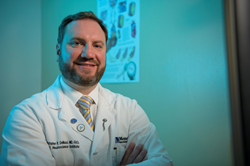
Dr. Christopher DeMassi, Chief,
Memorial Neuroscience Institute at
Memorial Healthcare System
“Patients no longer have to be awake and endure an uncomfortable surgery to help subside tremors, and other symptoms of Parkinson’s disease,” said Dr. DeMassi. “By coupling our team’s expertise with the ROSA, we offer a comfortable, safe surgical procedure with only one night stay in the hospital.”
HOLLYWOOD, Fla. (PRWEB)
February 20, 2023
Deep brain stimulation (DBS) is a proven surgical treatment where a neurosurgeon implants electrodes in a specific area of the brain to help relieve tremors and symptoms of stiffness and slowness in patients who have Parkinson’s disease or another movement disorder, such as dystonia. However, traditional DBS surgery can be unpleasant and painful, as it is performed while the patient is awake and requires individuals to stop taking any medications to control their movement disorders.
Memorial Neuroscience Institute is the first in South Florida to offer an advanced method of DBS that is performed while the patient is comfortably asleep under general anesthesia. Using the Robotic Surgical Assistant (ROSA) and an intraoperative computed tomography (CT) scan to precisely target and verify accurate positioning of the DBS electrodes, Dr. Christopher DeMassi, chief of Memorial Neuroscience Institute, and his team successfully completed a robotic-assisted asleep DBS in half the time of a traditional DBS surgery.
“Gone are the days when patients had to be awake and endure an uncomfortable surgery to help subside tremors, stiffness and other symptoms related to Parkinson’s disease,” said Dr. DeMassi. “By coupling our team’s expertise with robotic innovation like the ROSA, we are offering our patients a comfortable, safe surgical procedure that generally requires only one night in the hospital and offers them long-term relief.”
Within a week or two after the initial DBS surgery, the patient returns for a 10-minute outpatient procedure to place a small battery/generator under the skin near the collarbone. The electrodes are then connected to the battery and begin to deliver continuous electrical stimulation to areas of the patient’s brain that carry abnormal signals that produce some symptoms of Parkinson’s disease and other movement disorders.
“Our team of neurologists, neuropsychologists and neurosurgeons perform a detailed evaluation of each patient to determine their care plan,” said Dr. Harsh Gupta, neurologist who specializes in movement disorders at Memorial Neuroscience Institute. “Generally, the DBS procedure benefits patients who no longer respond to medications that reduce symptoms of movement disorders or are having significant side effects from these medications.”
Patients who want to learn more about DBS should speak with their neurologist or primary care physician who may refer them to Memorial Neuroscience Institute. To learn more about Memorial Neuroscience Institute, visit http://www.mhs.net/neuroscience or call 954-265-9500.
About Memorial Neuroscience Institute
Memorial Neuroscience Institute offers expertise in stroke, brain aneurysms, brain arteriovenous malformations, brain tumors, epilepsy, MS, neuromuscular disorders, spine disorders, movement disorders and more. Featuring a multidisciplinary team of experts, Memorial provides advanced diagnoses, leading-edge treatments, compassionate care, rehabilitation, and complete follow-up for some of the most complex neurological conditions and injuries. Neurosurgeons, neurologists, neurointerventional surgeons, neuro-oncologists, neurocritical care physicians and neuropsychologists, among others, collaborate to provide a complete continuum of neurological care. For additional information, http://www.mhs.net/neuroscience.
###
Share article on social media or email:

